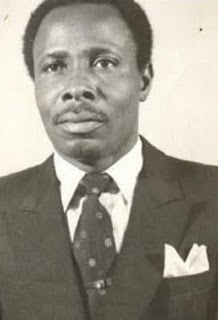I have actually been a little surprised by the global attention Michael Obi's abduction has garnered. ESPN, Yahoo and MSN are just a few major news outlets that have reported this sad news. I didn't realize he was viewed as a big enough star to command such coverage, but I'm glad that the word has gotten out. A friend of mine, a fellow sports journalist, emailed me asking how frequent kidnappings are in Nigeria. So as sad as this news is, I hope it can draw attention to the bigger issues contributing to this widespread problem.
Police have reported that the kidnappers have demanded a N20 million (about $130,000) ransom for Michael, who was kidnapped on Friday. Which should ordinarily be no problem for Mikel, who currently earns a little more than $100,000 a week playing for the English Premiership soccer team. But the dilemma is should Mikel cough up the money, which would only continue to encourage similar behavior or should he continue to plead for his father's release without a ransom?
Mikel Obi Michael Obi
In 2008, the brother of defender Joseph Yobo, also a Super Eagles (the Nigerian national soccer team name) player, was abducted in the oil rich city of Port Harcourt, Nigeria. He was released 12 days later, but the family and Police refused to say if a ransom was paid. I suspect, this may be the same approach taken in this case. Kidnapping in Nigeria has become a lucrative business, much like it is in Mexico and many South American countries where poverty and unemployment are the order of the day. But it only recently became the go-to method of getting paid in the mid to late 2000s. Nigeria earns significant revenue from black gold (oil), but very few Nigerians benefit from its profit. Nigeria doesn't have a welfare system that puts money in the pockets of unemployed or provides shelter for the destitute. It's simply a dog eat dog world out there. A form of Darwinism where the elite build up their wealth with the resources meant for the masses, with nothing trickling down to help the country's majority.
Residents of the the Niger Delta, which produces almost all of Nigeria's oil, have suffered the most under these circumstances. Ever since Shell Oil, with the support of the Nigerian government, set up a base in the Niger Delta, the living condition of its residents has significantly deteriorated. Just think of last year's massive oil spill off the Gulf Coast, but spread out over a period of about three decades, and you'd understand the diseases and desperation lurking among its people. With no compensation or jobs for its population, some of its educated youths have taken matters into their hands through an organization called the Movement Against the Emancipation of the Niger Delta (MEND).
The kidnappings started with foreign oil expatriates as a way to gain widespread attention, but has since increased as more people notice the government's lack of involvement in ending this practice. The Nigerian government has no control over anything that doesn't look like or cannot be benefited from oil. Unfortunately, the more unstable and desperate Nigerians have become, the more kidnappings have become the norm. Abductions have now expanded to include anyone suspected of being wealthy enough to let go of a large amount of cash with little to no repercussions for the perpetrators. Victims have included political figures and their families, popular Nollywood actors and notable athletes like Mikel Obi.
This is why I hope stories like Mikel's will continue to grab global attention by shining the spotlight on this problem and forcing the Goodluck Jonathan administration to address it and the many bombings and police attacks that are the latest extension to this never-ending story.


It is often the case that kidnappings are organised by close members of the vistims family. I wont be surprised if a cousin or uncle is behind this one.
ReplyDeleteVery true Gege. Family and domestic workers have been known to be keep perpetrators of kidnappings. Pray for his safe release.
ReplyDeleteReally nice writeup Wandoo!
ReplyDeleteYeah kidnapping has become the order of the day but there is no solution without a deterrent. Live by the gun, die by the gun, Period!!!
This is a tough one Wandoo. I tend to agree with those who say it's best not to give in to ransom demands, but wherever these kinds of kidnappings proliferate, their outcomes become increasingly unpredictable. Like Colombia. You may recall your predecessor (as graduate assistant to a certain professor) had one of his Colombian cousins kidnapped. He did not return alive. It's difficult for a family to go along with the advice of the authorities who tell them to wait things out while they investigate and plan an alternative solution, particularly if they see a way to put the cash together to free their loved one. But paying ransom definitely does encourage the behavior. I'm sure a ransom was paid in the Yobo case, for example. Certainly amounts should never be disclosed -- frankly it would probably be good if the demands were themselves never made public, as against censorship as I am. But when the numbers get bandied about, it only adds fuel to the excitement fire.
ReplyDelete